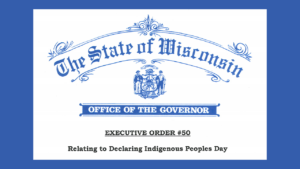One year ago, Governor Tony Evers signed Executive Order #50 declaring the second Monday in October Indigenous Peoples Day in Wisconsin. The order was the culmination of three years of advocacy on the part of students at Indian Community School (ICS) in Franklin, Wis. calling for a day of recognition for the earliest inhabitants of our region — a day to coincide and exist in conversation with the federally recognized Columbus Day.

Aaron Bird Bear, Director of Tribal Relations at the University of Wisconsin-Madison, in a 2019 interview with Wisconsin Public Radio, described the significance of Indigenous Peoples Day as “a wonderful acknowledgment of the 12,000 years of human life here in the Western Great Lakes.” He stressed the crucial importance of telling “our full history instead of just a colonial history when new residents from other continents and the other hemisphere joined us here on Turtle Island.”
The creation stories of the First Nations of the Northeast refer to what we call North America as Turtle Island and the name is commonly used by First Nations people, indigenous activists and allies. “I think Indigenous Peoples Day is a wonderful acknowledgment of the full humanity of this place,” shared Bird Bear.
Incorporated into the daily mission of PBS Wisconsin is a longstanding commitment to partner with the members of our Indigenous community to amplify their histories, affirm and celebrate their contemporary presence and contributions to our state, listen to their stories, and offer authentic educational resources for use by Wisconsin teachers and caregivers.
On Indigenous Peoples Day, in particular, we offer our deep gratitude for that partnership and invite our audience to celebrate with us by taking a deep dive into two of our most comprehensive resources.
Our Tribal Histories series of documentaries features tribal storytellers sharing the culture and oral traditions that have shaped their communities across generations. The series of half-hour programs presents the histories of all eleven federally recognized American Indian tribes and bands located in Wisconsin, plus one tribe that is seeking to regain its federal status. These stories are the product of a shift long called for by members of our First Nations to tell their own stories in their own voices to non-Native audiences. Explore the entire series here.
For teachers and caregivers, specifically, PBS Wisconsin Education, in concert with a coalition of partners, offers an extensive website of K-12 educational resources, Wisconsin First Nations: American Indian Studies in Wisconsin. This collection provides educators and pre-service teachers accurate and authentic educational materials for teaching about the American Indian Nations of Wisconsin, along with teacher professional development resources.
Found at www.wisconsinfirstnations.org, it also assists educators in fulfilling Wisconsin Education Act 31, the statutory requirement that all school districts provide instruction in the history, culture, and tribal sovereignty of the American Indian nations in the state. Learn more about the history and context of Act 31 below as J P Leary, Associate Professor in First Nations Studies at UW-Green Bay, explains how it impacted teacher certification.
Finally, visit PBS Wisconsin in November for Native American Heritage Month, and the national celebration of our First Nations communities. All month, on broadcast and on-demand, we’ll be highlighting a wide range of public media content highlighting the voices of Indigenous Americans.
INDIGENOUS PEOPLES DAY TRIBAL HISTORIES WISCONSIN FIRST NATIONS